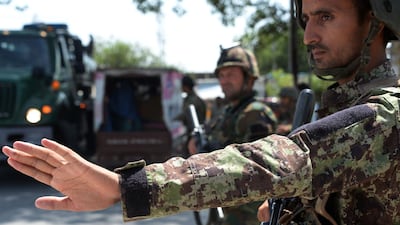The elimination of Abu Saeed Orakzai, also known as Saad Arhabi, leader of the ISIS faction based in Afghanistan, is a rare example of the counter-terrorism successes that can be achieved when otherwise competing powers focus their combined efforts on eliminating a common threat.
A series of recent diplomatic developments and tactical behaviour on the battlegrounds of Afghanistan point to the collusion of the mainstream warring parties in the operation which led to the fatal US airstrike on Arhabi, the fourth chief of ISIS Khorasan (ISIS-K) to be killed in such a manner since 2016.
The political representatives of the Taliban have re-engaged with US officials in talks meant to set the stage for multilaterally sponsored direct negotiations with the Afghan government. Although this failed to yield a second consecutive Eid ceasefire, much to the chagrin of Afghan President Ashraf Ghani, clearly the Taliban is working towards achieving international recognition as a legitimate political entity. This also explains the recent visits of Taliban representatives to Indonesia and Uzbekistan and its agreement to participate in a forthcoming Russia-hosted conference, called off at Kabul's insistence.
The stated shared interest of all these powers is to prevent the further spread of ISIS into Asia, where it is becoming increasingly active. With the loss of strongholds in parts of the Middle East and North Africa, the obvious destination for fleeing ISIS leadership figures and their Central Asian cohorts is Afghanistan. It is comfortingly familiar turf for many veteran ISIS leaders, who spent the better part of a decade there during the Taliban regime prior to the 9/11 attacks in the US.
Abu Musab Al Zarqawi, the founder of Al Qaeda in Iraq – the precursor of ISIS – lived in Afghanistan and Pakistan for nine years. After the US invasion, other such characters took refuge in the ungoverned spaces of Pakistan’s tribal areas which border the districts of eastern Afghanistan currently occupied by ISIS-K and its Tehreek-i-Taliban Pakistan (TTP) allies. Abu Bakr Al Baghdadi reportedly spent time in North Waziristan in 2012 and 2013 prior to establishing ISIS.
Against this backdrop, Afghan and US forces shouldered arms in July when the Taliban launched a decisive ground assault against a militia allied with ISIS-K which had occupied remote areas of northern Jowzjan province for the past two years. Like their colleagues in the eastern provinces of Nangarhar, Kunar and Nurestan, these ISIS occupiers imposed a reign of terror on the residents of the area, evoking parallel calls for help to the government and the Taliban.
Apparently, a deal of sorts was secretly struck with the US and Afghan authorities, because the insurgents were not disturbed as they gathered 2,000 fighters on two fronts and made their fourth and final move to defeat the ISIS faction there.
Shockingly to many, Afghan forces struck a second deal with the leaders of the defeated faction and helped to evacuate the surviving ISIS-K fighters. Its leaders even boasted that they had dictated the terms of their surrender while the Afghan government justified its actions under Mr Ghani’s broader policy of reconciliation with surrendering warlords such as Gulbuddin Hekmatyar. Then it was claimed that the captives would be treated as prisoners of war.
This exemplifies the complicated political landscape in Afghanistan. The subsequent Taliban assault on Ghazni this month exploited a gap in the city's stressed defences created by the redeployment of Afghan commando units and US Special Forces to operations after ISIS-K in Nangarhar.
Likewise, the Taliban has trumpeted its successes against ISIS-K in Jowzjan and, while dismissing the government’s call for an extended ceasefire, announced plans for a similar operation against its strongholds in Nangarhar. The Taliban’s social media propagandists have since complained that their fighters in the area have been targeted by US air power and Afghan security forces.
Behind the scenes, however, they have been sharing intelligence on ISIS-K with local Afghan military commanders and intelligence operatives of the National Directorate of Security since the menace emerged in late 2014, just as they did in Jowzjan recently.
The Taliban is also an important source of intelligence for Pakistan’s security services about the increasing incidence of cross-border terrorist attacks by ISIS-K and TTP. Since the terrorists were forced to flee Pakistan’s tribal areas in 2015, these attacks have largely targeted security personnel in Pakistan’s western provinces of Khyber Pakhtunkhwa and Baluchistan.
Recently they have become more brazen, resuming attacks on prominent politicians during the recent general election campaign. They are also suspected of involvement in a recent suicide bombing attack on Chinese mine workers, claimed by armed secular Baluch separatists who have never before resorted to such methods.
A Chinese-mediated rapprochement earlier this year between the Ghani administration and the Pakistan army chief of staff, general Qamar Javed Bajwa, resulted in a transfer of key intelligence – some of it undoubtedly Taliban-sourced – leading to the elimination of TTP chief Mullah Fazlullah in a US airstrike.
Similarly, the Pakistani security authorities and the Taliban had every motivation to assist the Americans in their efforts to eradicate Arhabi, despite finger-pointing by Mr Ghani over the debacle in Ghazni and his dismissal – and reinstatement – of most of his war cabinet. The Afghan president has also hardened his position on foreign powers hosting the Taliban, joining hands with the US to boycott the Russia-hosted moot, forcing Moscow to cancel the event.
The brinkmanship of all the mainstream players is as big a threat to the future stability of Afghanistan and the adjoining nuclear-armed region as ISIS-K. The longer it continues, the greater the chaos and space available to the terrorists to exploit. The sooner the powers-that-be prioritise their shared enmity against ISIS-K over selfish ambitions, the better for the world at large.
Tom Hussain is an Islamabad-based newspaper editor and political analyst

